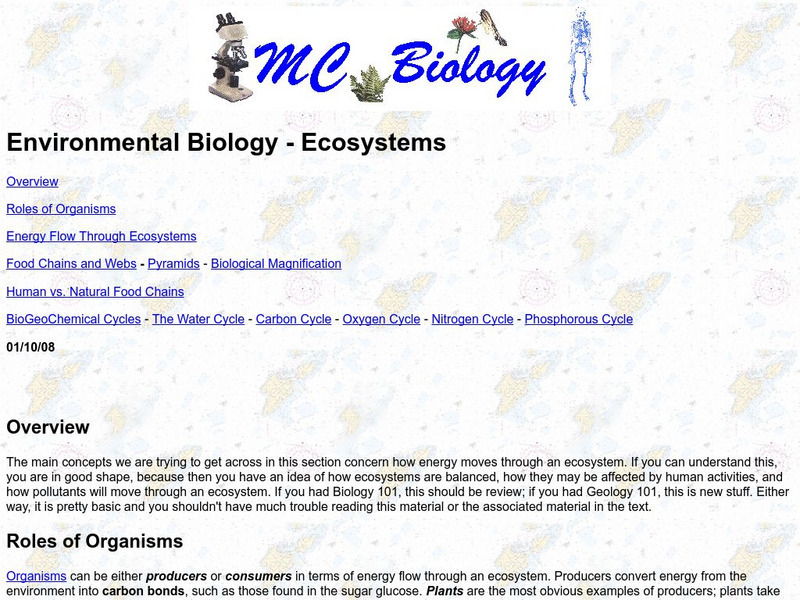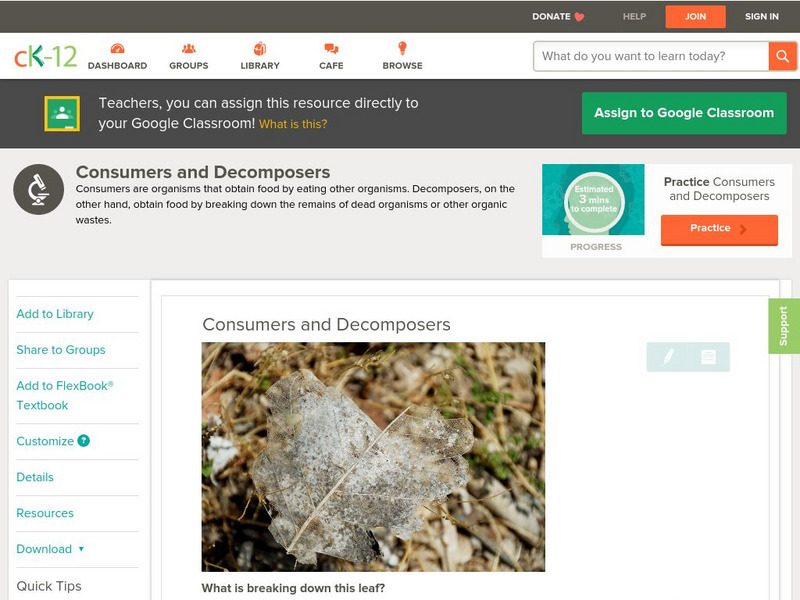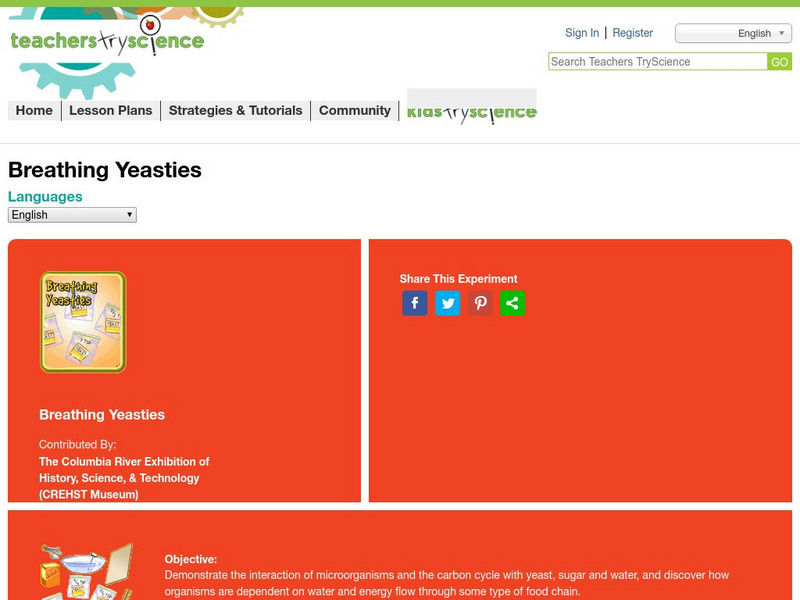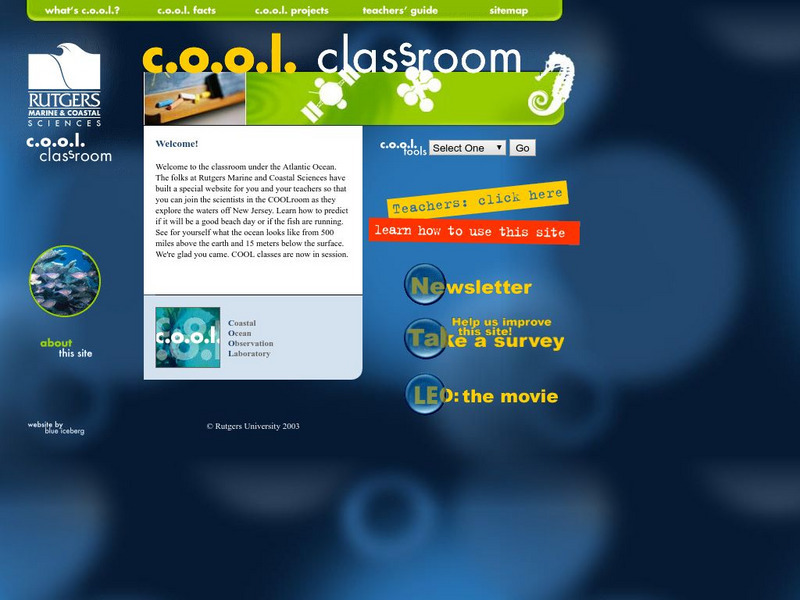PBS
Pbs Teachers: Predator Protector Game Lesson
Describe the habitat, food web and ecosystem of shark species. Identify threats to sharks and explore how top predators help to maintain the balance of nature within ecosystems. This lesson plan also contains an interactive game.
Texas Education Agency
Texas Gateway: Energy and Matter in Ecosystems
Learners analyze food chains, webs, and pyramids to determine how energy flows and matter cycles through ecosystems.
Other
Marietta College: Biology: Energy Flow Through the Ecosystem
Read to understand how energy and inorganic nutrients flow through a food chain in an ecosystem.
Science Struck
Science Struck: Examples of Tertiary Consumers
Explains what is meant by a tertiary consumer in a food chain and provides examples.
ArtsNow
Arts Now Learning: Ecosystems in Action [Pdf]
In this lesson, 4th graders explore animals and plants that inhabit ecosystems by using movement to deepen the retention of vocabulary. After reviewing the ecosystem players, students will play a call and response game by responding with...
CK-12 Foundation
Ck 12: Life Science: Consumers and Decomposers
[Free Registration/Login may be required to access all resource tools.] Producers make their own food through photosynthesis. But many organisms are not producers and cannot make their own food, but must get their energy from other...
ArtsNow
Arts Now Learning: Using Tableau and Role Drama to Examine the Ecosystem [Pdf]
In this lesson, 4th graders use tableaux to dramatize their roles in the food chain of an ecosystem. Next, they write in role arguing why they are important to the ecosystem. This is followed by a debate in the format of a Character...
Teachers TryScience
Teachers Try Science: Breathing Yeasties
See how combining yeast, sugar, and water can demonstrate the carbon cycle and show how microorganisms work in the food chain.
Polk Brothers Foundation Center for Urban Education at DePaul University
De Paul University: Center for Urban Education: Changing the Ecosystem [Pdf]
"Changing the Ecosystem" is a one page, nonfiction, reading passage about the disruption in the food chain due to habitat loss and pollution and the results of that disruption. It is followed by questions which require students to...
BBC
Bbc Schools: Living Things: Food Chains Quiz
How are animals and plants linked? What is the difference between a producer and consumer? How is a predator different from prey? Take this food chain quiz to find out the answers to these questions and more. Links allow you to convert...
Other
Rutgers Marine & Coastal Sciences: Cool Classroom
Students and teachers can explore the work of marine scientists and observe the ocean from their computers. Learn about Rutgers Coastal Ocean Observation Laboratory, discover why oceanography is important, and see what life is like in...
TeachEngineering
Teach Engineering: Biodomes
Students explore the biosphere's environments and ecosystems, learning along the way about the plants, animals, resources and natural cycles of our planet. Over the course of lessons 2-6, students use their growing understanding of...
Shmoop University
Shmoop: Ecosystem Energy Flow
Explains the processes by which energy flows through an ecosystem. Covers the meanings of key vocabulary, e.g., types of producers and consumers, trophic levels, food webs, and the energy pyramid.
Science Struck
Science Struck: Decomposers in the Ocean: Role and Examples
Describes five different types of decomposers that feed on decaying organic matter in the oceans and that are at the bottom of the ocean food chain.
BiologyWise
Biology Wise: Understanding the Process of Biological Magnification
Biological magnification is the term used to described the increasing accumulation of substances in organisms as one looks at higher trophic levels in a food chain. When that substance is a toxin, such as a heavy metal or a pesticide,...
Planet Pals
Planet Pals: Producers
This colorful site examines the food chain and delves into an explanation of what producers are and where they fit in an overall ecosystem.
CK-12 Foundation
Ck 12: Episd: Energy Pyramids
[Free Registration/Login may be required to access all resource tools.] Understand how energy flows within ecosystems through the use of energy pyramids.
CK-12 Foundation
Ck 12: Episd: Consumers and Decomposers
[Free Registration/Login may be required to access all resource tools.] Based upon the way organisms acquire their energy students will understand how to group them as consumers, decomposers or producers.
Other
Kidwings: Virtual Owl Pellet Dissection
A complete lesson on owl pellets. Students can read information, watch a tutorial, and use their computer mouse to complete a dissection simulation right there on the screen.
Georgia Department of Education
Ga Virtual Learning: Ecosystems
This module offers an in depth study of the fundamental components of ecosystems. Activities include mini-lessons with videos and student assignments.
Tramline
Virtual Field Trip: Temperate Forest Biome
Travel with your students on a Virtual Field Trip to learn about Temperate Forest Biomes. You will also discover many informative and interactive websites.
Annenberg Foundation
Annenberg Learner: The Habitable Planet: Ecosystems: Energy Flow Through
Detailed explanation of the processes by which energy flows through an ecosystem. Scroll down and open Section 3.
Massachusetts Institute of Technology
Mit: Open Course Ware: Courses: Civil Environmental: Ecology I: The Earth System
College-level online course highlighting the fundamentals of ecology. Course topics include coevolution of the biosphere, geosphere, atmosphere, and hydrosphere; photosynthesis and respiration; and the carbon, nitrogen, and water cycles....
Mocomi & Anibrain Digital Technologies
Mocomi: What Is an Ecosystem?
Learn about ecosystems, how they work, codependency, and food chains.
Other popular searches
- Food Chains Food Webs
- Food Chains and Webs
- Food Chains and Food Webs
- Food Chain Food Web
- Food Chains, Food Webs
- Food Chains Webs
- Ecology Food Webs Chains
- Food Chain/ Food Web
- Food Chain Web
- Food Chain and Food Webs
- Food Chain and Webs
- Food Chain/web


















